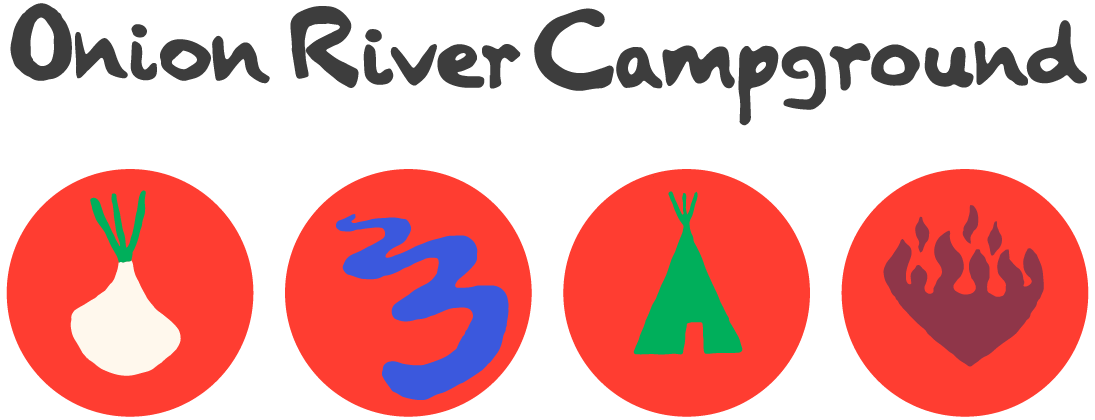Frequently Asked Questions
Why Are There Sandy Areas and Imperfect Shorelines?
In July 2023, the Onion River reminded us who she is. A historic flood—Vermont’s most powerful in a century—cut a 120-foot-long, 8-foot-deep, and 20-foot-wide channel through our road, campsites, power and water lines, and bathhouse. She reshaped over three acres of this land, uprooting trees, exposing roots, and leaving swaths of bare ground that look more like desert or moonscape than manicured campground.
We could have rushed to “restore” or “repair” the land to its pre-flood state. Many businesses have tried to become “floodproof” or “flood-resistant.” But we are listening for something deeper.
Instead of resisting the river, we have chosen to be flood-inviting.
We’ve restored what was essential for safety and access—our infrastructure—but we refuse to “fix” what the river has asked to rearrange. To reassert human control over her body would be to reenact the very colonial impulses that have led to climate destabilization. At Onion River Campground, we honor this sacred bend in the river not by taming it, but by being in relationship with it.
We don’t see exposed roots and sandy stretches as flaws, but as invitations. The river is teaching us. Sometimes we all need to spread out, overflow, break patterns. Sometimes change looks messy. Sometimes healing does too.
So if you notice moonscapes or raw earth where grass used to be—pause. Listen. The land is in conversation with the river. And with you.
We are not just on the floodplain.
We are the floodplain.
Nutrient-dense. Ever-changing. Ready.
What is the weight limit on the bridge to cross the river?
It is 60k lb even though the sign reads 24k lb. Even though the state (unexplainably) requires this (inaccurate) sign be posted at the bridge, The Town of Marshfield can confirm that the limit is 60k lb.
Why isn’t the campground more “manicured”?
Because we are not a resort—we’re a regenerative ecosystem and a relational experiment. While you’ll find clean showers, cared-for trails, and responsive humans, you’ll also encounter brush piles, root balls, sandy swaths, wildflowers in “wrong” places, and ongoing collaborations with the forces of nature.
Some of our long-term guests live here seasonally. Others are passing through. We ask all campers to show up not as critics or consumers, but as temporary stewards and cohabitants.
This place is not curated for comfort. It’s curated for aliveness.
What kind of people stay here?
You’ll meet people living out of fifth wheels, school buses, tents, and tiny dreams. Some are working-class Vermonters making a life in place. Others are wandering artists, forest nerds, traveling families, or retirees seeking simplicity.
You may be parked next to someone who is unhoused but deeply housed in themselves. We don’t screen for income, class, or gear quality. We do aspire to screen for kindness, curiosity, and consent.
Is this campground for everyone?
Not quite. If you are seeking a luxury RV resort with paved 50-amp hookup sites, mowed turf, and tidy boundaries between you and your neighbors, you may not be at ease here.
If you’re open to complexity, wildness, and meeting others across difference, then you might just find yourself deeply at home.
Are the campground hosts always on-site?
Nope. Our team is sometimes diffused across time and terrain. That means we trust campers to be self-directed, neighborly, and communicative when needs arise.
We check messages regularly and are reachable for anything urgent. But mostly, this place runs on mutual respect and collective presence.
Do you host long-term or unhoused campers?
Yes, and we’re proud to. Affordable, dignified access to land is increasingly rare. We believe a healthy campground is one where folks in different life circumstances can coexist and care for shared space together.
This is not a transitional shelter, and we’re not social workers—but we are practicing mutual aid, not charity. That means respect flows in all directions.
What are your quiet hours?
We ask for quiet after 10pm, but this isn’t enforced like a curfew—it’s a rhythm we ask you to tune into. Some folks are here to heal. Others are here to rest between labor. Some are walking through grief, or awakening joy. The land holds all of this.
So rather than a rule, think of quiet hours as a collective offering. After 10, let the forest speak louder than your Bluetooth speaker. Let the crickets carry the night’s energy. Let laughter linger, but whispers hold the center.
What kind of campground etiquette do you expect?
Our only real rule is relational presence. That means:
Clean up after yourself—and a little more than just yourself
Introduce yourself to a neighbor or don’t—but be open
Give wide berth for difference, grief, neurodivergence, and solitude
Keep dogs leashed or under voice control, and their poop off the path
Ask before entering someone’s site
How do I know if this is the right place for me?
If you're looking for tidy divisions between nature and humanity, this may not be your place.
But if you’re ready to be unsettled in the best ways—to experience land not as backdrop but as being; to camp among people with different rhythms than yours; to let go of control and receive a different kind of welcome—you’re already halfway home.
Vermont Flood: Podcast Interview with Owner Jaquelyn Rieke
Vic Guadagno of Bordertown interviews Jaquelyn Rieke, Owner of Onion River Campground. Jaquelyn speaks of the lessons she learned from the river as it rose around her home in July 2023, stranding her and several other residents of the campground.

